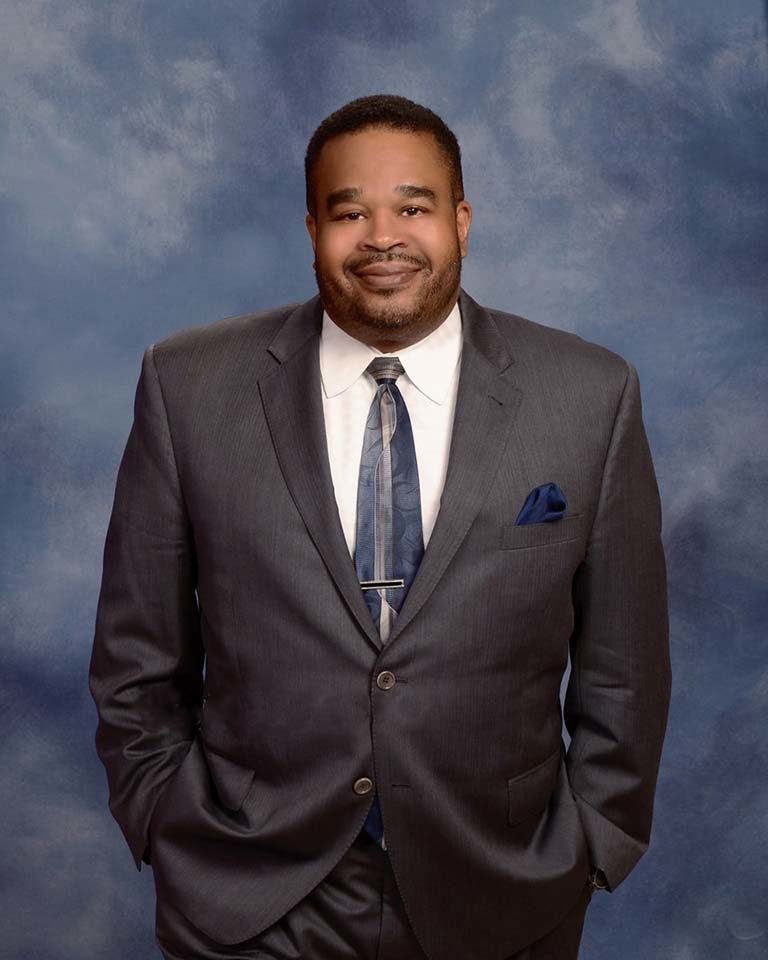Leadership
Antioch’s leadership views ministry as service to God and to the people of God. They are leaders who seek God’s guidance and direction. Ministry meetings always begin and end in prayer. Ministries are led in the manner of Colossians 3:17 “And whatever you do, whether in word or deed, do it all in the name of the Lord Jesus, giving thanks to God the Father through him.”

Reverend Merle D. McJunkin
Pastor McJunkin emphasizes bible study and has presented courses such as “Get the Most Out of Studying Your Bible—Old and New Testament” and “Unwrapping Your Spiritual Gifts.” He has focused on the issue of “food insecurity” in our region and introduced a program called Harvest Community. Local farmers donated fresh-picked unsold produce which Antioch then distributed to those in need in the community.
The Railroad Avenue Project. In 2015, Antioch Trustees, Westchester County, and the Town of Bedford teamed up to investigate the possibility of using the Railroad Avenue properties, which Antioch had purchased during Pastor Strother’s tenure, for affordable housing. In a series of transactions, Westchester County bought the properties from Antioch, then transferred them to a non-profit corporation that had the mission of developing and operating the affordable housing project.
Antioch used the funds from the sale to pay off the mortgage from the 2009 renovation, renovate the exterior, and improve accessibility for all to the church building at One Strother Crossing. The non-profit corporation was named Antioch Homes to preserve the historical link between Antioch Baptist Church and the properties. Construction began March 2017, and the initial tenants took residence in December 2017. Both the education building and the pastor’s house were demolished and replaced with new modular buildings. The old church building was completely renovated and converted to four one-bedroom apartments. Altogether, the three buildings contain eight one-bedroom and four two-bedroom apartments.
New initiatives. Pastor McJunkin has implemented new ministry initiatives, missions, and outreach activities, and teaching/training courses for church staff and members. He has directed greater resources of time and energy to develop programs and activities for our children and young adults. Our youth participated in a six-week Summer Enrichment Program that offered courses in math, app development, and robotics; SAT/ACT preparation courses and a joint Civil Rights Trip with Temple Beth El to Selma, Birmingham, Montgomery, and Atlanta. Funding for youth programs also increased from generous donors.
An Active Church. Under Pastor McJunkin’s leadership, Antioch reenacted the events of Maundy Thursday. We continued our annual commitment to feed and house homeless people for a week every winter (as a member of the Emergency Shelter Partnership); sent Special Hurricane Relief offerings to Houston and Puerto Rico in 2017; made lap quilts for nursing home residents and T-shirt dresses for young girls in Haiti. The Social Justice Ministry held community meals, “Undoing Racism” workshops, book discussions, and a solidarity march to support our immigrant neighbors. Ministry annual days and activities fill the church calendar. And the Music Ministry continues to enrich our worship services in song and with multiple instruments of praise.
Fellowship matters. Pastor McJunkin delights in watching the Holy Spirit transform lives through the many ministries of the church. “We are a people of prayer, purpose, and passion,” says Pastor McJunkin of the Antioch fellowship. “We are family! We strive to continue being a Holy Spirit-led, ever-maturing, and ever-developing congregation where people of diverse ethnicities worship and grow in faith development and service.”
Eight Characteristics of Christian Transformational Leaders
1. Patience – maintaining a long-term perspective and staying committed to goals in the face of short-term obstacles and resistance. (Colossians 1:10-12)
2. Gentleness – dealing with vulnerabilities, disclosures and feelings others might express without harshness, hardness or forcefulness. (1 Peter 3:15-16)
3. Teachableness – operating with the assumption that one does not have all the answers, all the insights; valuing the different viewpoints, judgments and experiences others may have. (1 Corinthians 12:28-30)
4. Kindness – remembering the little things (which are the big things) in relationships; being sensitive, caring and thoughtful. (1 Corinthians 13:4)
5. Openness – assimilating accurate information and perspectives about others’ potential while affirming who they are now, regardless of what they own, control or do; giving full consideration to their intentions, desires, values and goals rather than focusing exclusively on their behavior. (Matthew 18:15-20)
6. Compassionate Confrontation – acknowledging errors, mistakes and the need for others to make “course corrections” in a context of genuine care, concern and warmth; making it safe for others to risk. (1 Peter 3:8)
7. Consistency – congruity among successive acts, ideas or events to that one’s leadership style becomes a set of values, a personal code, a manifestation of one’s character, a reflection of who one is and who one is becoming; not a manipulative technique brought into play when someone does not get his or her way, is faced with crisis or challenge or is feeling trapped. (Ephesians 5:8-10)
8. Integrity – matching words and feelings honestly with thought and actions, with no desire other than for the good of others and without malice or desire to deceive, take advantage, manipulate or control; constantly reviewing the intent as one strives for congruence. (Titus 2:6-8)
